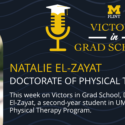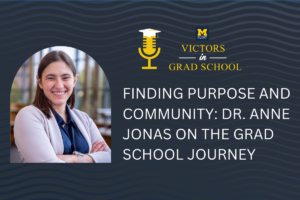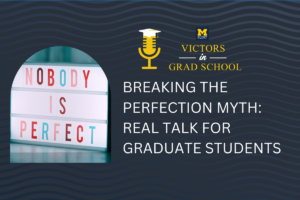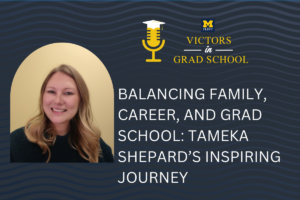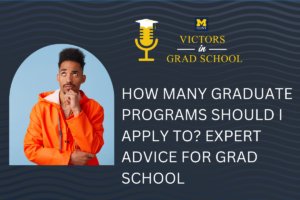Entering graduate school can be a daunting prospect, especially for first-generation college students like Natalie El-Zayat. In a recent episode of the Victors in Grad School podcast, Natalie shared her experiences as a second-year Doctorate of Physical Therapy student at the University of Michigan Flint, shedding light on her journey from undergrad to grad school and offering valuable insights for anyone considering a similar path.
From Undergrad to Grad School:
The Decision to Pursue Physical Therapy Natalie’s desire to be part of the medical field led her on a personal journey of discovery. Her decision to pursue physical therapy was influenced by witnessing her uncle’s rehabilitation journey after suffering a stroke. Beyond the physical aspects of therapy, Natalie was drawn to the mental and emotional support involved, which ignited her passion for this field. The importance of building long-term patient relationships and the holistic approach to care solidified her choice to pursue physical therapy as a career.
Choosing the Right Program: Factors to Consider
When deciding where to pursue her doctorate, Natalie emphasized the significance of considering the type of support and community offered by the university. As a first-generation college student, the support and guidance she received at the undergraduate level were instrumental in her decision to attend the University of Michigan Flint. The emphasis on being more than just a student, but a colleague, and the dedication to service and clinical experience played a significant role in her ultimate choice.
Challenges Faced as a First-Generation Graduate Student
Natalie acknowledged the learning curve she faced transitioning from undergraduate to graduate school. As a first-generation student, she highlighted the importance of asking for help and seeking support. Balancing the rigorous program of graduate school while maintaining a life balance was a key learning point for her. She emphasized the need for self-compassion and patience, recognizing that perfection is not attainable and that the journey will have its ups and downs.
Strategies for Success: Adapting Study Techniques
Natalie’s journey emphasized the evolution of her study techniques. From initially focusing on memorization for exams to shifting towards understanding and making connections, she recognized the need to adapt and refine her approach to learning. Mind mapping and seeking advice from faculty and other resources played an essential role in her academic journey. By prioritizing learning over grades, she found a more sustainable and effective way to navigate the challenging curriculum.
Clinical Opportunities and Insights: Heart Clinic Experience
Natalie’s experience at the Heart Clinic, where she gained firsthand clinical exposure, provided valuable insights for prospective physical therapy students. She highlighted the importance of understanding the patient population and types of pathologies covered in the clinical setting. Additionally, she emphasized the significance of seeking out the right resources and the value of mentors in making the most of clinical experiences.
Encouraging Others: Tips for Prospective Graduate Students
In offering advice to prospective graduate students, Natalie emphasized maintaining a life balance, practicing self-compassion, and seeking support from peers and mentors. Her journey serves as a testament to the importance of adapting study techniques, prioritizing holistic understanding, and recognizing the value of personal well-being throughout the graduate school journey.
Conclusion: A Journey of Growth and Resilience
Natalie’s journey offers invaluable insights for anyone considering a graduate education, particularly in physical therapy or related fields. Her experiences exemplify the challenges and triumphs that come with pursuing higher education, especially as a first-generation student. Her emphasis on adaptability, self-compassion, and seeking support underscores the importance of a holistic approach to success in graduate school.
Finding success in graduate school is not just about academic performance but also about personal growth, resilience, and a dedication to holistic learning. Natalie El-Zayat’s journey serves as an inspirational guide for anyone embarking on their own path through graduate education.
In conclusion, Natalie’s experiences highlight the multifaceted nature of the graduate school journey, offering valuable insights into the challenges and opportunities it presents. Her story serves as a testament to the importance of adaptability, self-compassion, and seeking support as essential components of success in graduate school.
TRANSCRIPT
Dr. Christopher Lewis [00:00:01]:
Welcome to the Victor’s in Grad School, where we have conversations with students, alumni, and experts about what it takes to find success in graduate school.
Dr. Christopher Lewis [00:00:11]:
Welcome back to Victors in Grad School. I’m your host, Doctor Christopher Lewis, director of graduate programs at the University of Michigan Flint. Really excited to have you back again this week. Every week, I love being able to sit down with you, to talk to you, to walk alongside of you on this journey that you’re on. This you may be Already in grad school, you may be just starting to think about grad school. You could be toward the end and seeing that light at the end of the tunnel. No matter where you are, you can do something each day to be able to prepare yourself, to be able to work on finding success for you in this journey that you’re on. And that’s what this show is all about.
Dr. Christopher Lewis [00:00:50]:
Every week, we walk together and talk about things that are important to you, things that are going to help you To make choices that to find ways to be able to to find that success in your in that journey that you’re on. And every week, I love being able to bring you Different people. People that have gone before you are in graduate school currently, have gone to graduate school, and are able to bring Something back to you to share that journey with you and hopefully give you some kernels of knowledge, something that you can Take from to be able to help you as you make choices yourself. Today, we’ve got another great guest with us today. Natalie El Zayat is with us today, and Natalie is a 2nd year physical therapy student, doctorate of physical therapy student at the University of Michigan Flint. And I’m really excited to have her here today and to welcome her to the show. Natalie, thanks so much for being here.
Natalie El-Zayat [00:01:47]:
I really appreciate you for inviting me on your show. Honestly, it’s been a pleasure so far, so I’m excited to see, what conversations we have.
Dr. Christopher Lewis [00:01:55]:
Well, 1st and foremost, one of the things that I I love to do is be able to really turn the clock back in time. So I would love to go backwards a bit Because I know that you were at the University of Michigan Dearborn for your undergraduate degree. You were working through that. And at some point in that journey, in that time at the University of Michigan Dearborn. You made a choice to go to graduate school. What were the reasons that you chose to go to graduate school?
Natalie El-Zayat [00:02:21]:
So I Always knew that in some aspect, I wanted to be in the medical field. I didn’t know what part of the medical field I wanted to be in. When I was kind of going through that process that everybody goes through in their twenties, where they’re trying to decipher what route is my route, which way do I wanna go, Basically, I had an uncle of mine who, after having going through a bout of malaria, he ended up suffering a stroke. And I got to see his Rehab journey from day 1 and to see that it wasn’t only the physiological elements. It wasn’t only the physical part of therapy that he was struggling with, but also the mental. Anybody that, you know, has had a stroke of some sort has had several parts of their brain affected. So I feel like it was just Something that piqued my interest, I think seeing his therapist work with him day in, day out to try improve and improve his outcomes was something that I was, You know, really drawn to. A lot of times with doctors or nurses, they don’t have the luxury of being long term with their patients and building relationships with them.
Natalie El-Zayat [00:03:25]:
So I think that’s something that drew me to physical therapy and made me want to continue down that path. So, yeah, I just wanted to, you know, develop myself professionally and be able to make those connections of patients.
Dr. Christopher Lewis [00:03:37]:
Now as you made that decision to go to physical therapy school, to go to get a doctorate in physical therapy, You decided eventually that you wanted to attend the University of Michigan, Flint, and I’m sure that you had a number of options. You probably could have gone to many different places Across the state of Michigan or beyond. Talk to me about the decision making process and what made you ultimately that you wanted to attend the University of Michigan Flint.
Natalie El-Zayat [00:04:03]:
As somebody who was an alumnus from a University of Michigan’s school, like, from a Pacific campus. I graduated from the University of Michigan Dearborn. I feel like I was always impressed by the amount of support that I was given As a student, you know, they have, like, their start program, which kind of, like, helps students who don’t necessarily know what path they want to go to with advising or, like, helping them select classes and things like that. And I think just that amount of Or as somebody who is a 1st generation college student, that is gold right there. That help is just something that is is really, really important to me. So Knowing that and then going to an open house at the University of Michigan Flint, I got to meet, with some of the faculty. And what they emphasized Was the fact that, you know, you’re not just a student, you’re a colleague. You’re somebody that, you know, you can you you can see your professors as colleagues.
Natalie El-Zayat [00:05:00]:
You can go to them, get advice. You know, they really want the best for you, and they wanna push your education as far as it will go. And I think that was something that really drew me in. It made me feel like if I do go to the school, you know, graduate school is difficult. It’s, rigorous. There’s a lot of time spent, a lot of studying to do, and I think just that support aspect was something that really drove me to wanting To go there as well as their dedication kind of to service. You know, we have our pro bono clinic, the heart clinic, even that just Being able to actually work with patients every week, I think, is just something that also drove me to selecting the University of Michigan as my choice for this doctoral program.
Dr. Christopher Lewis [00:05:49]:
Now one of the questions that I guess that I would ask you along with that would be is you talked about being a 1st generation college student. And as you’re going through undergrad as a 1st generation college student, There are definite things you don’t know, definite things that you have to learn along the way. And by the time you finish, You probably are feeling a little more confident, but then you transition not only to a new school, but you transition to a whole new way of learning. And as a 1st generation college student, talk to me about that transition for you. And what did you have to learn for yourself, Maybe the hard way to be able to allow you to get to a bit of a better point, Maybe now in the 2nd year in the program where you’re feeling more confident because of the fact that you understand what’s being expected.
Natalie El-Zayat [00:06:42]:
So just circling back to my undergrad, I think the thing the lesson that I learned, that was the most useful, the most impactful was that Ask for help. People want to help. You just need to ask for it. And I think there’s that, like, aspect of wanting to be independent and, like, self sufficient and and things like that. But if you don’t ask for help, you’re never gonna really know, like, how to approach something the best way way because people have done it before you. They’ve done it efficiently. They may maybe have mastered the way to do something. So I feel like that aspect is really and that’s something that I brought with me to, you know, the physical therapy program.
Natalie El-Zayat [00:07:20]:
I think one thing that I wasn’t necessarily prepared for When entering graduate school was just the amount the volume the volume of information that is gonna be presented to you. And I remember that 1st week just thinking to myself, like, oh my god. I don’t think I’m put out for this. You know? Like, everybody has that, like, Challenge with imposter syndrome. But at the end of the day, I think I went back onto the idea of help and just We’re reaching out to professors, tutoring. I still utilize tutoring till this day. I try and get as much information from other people as I on how to handle these classes. And if I ever need to speak to an adviser or anything like that and have faculty advisers.
Natalie El-Zayat [00:08:03]:
So I think just leaning in to that help Has been really helpful, but also leaning on my support system, leaning on my family just to try and help me get, you know, through this. So it’s It’s been a challenge navigating higher education. I’m the 1st one to do it in my family. So I it’s been a learning process, but, I mean, hopefully I mean, so far, I’ve I’ve Managed to be successful, and I hope to continue to do so. So, yeah, I would say just leaning on your support system and trying to find help where it’s given.
Dr. Christopher Lewis [00:08:32]:
Now you talked about specifically that transition for yourself as a 1st generation college student. And I guess I I also just kinda Question, and it may be that it’s the exact same answer here. But as you think about now, you said you’ve been successful. You found success In this journey thus far, and this is a 3 year program that you’re in. You’re in the 2nd year. So you found success, and you made that transition well into the program. As you think back to that 1st year in the program into the 2nd year of the program, what did you have to do? What did you have to set up for yourself, and What did you have to specifically do for yourself to be able to set yourself up for success, and what have you had to do as you’ve moved along To maintain that success throughout your graduate school journey.
Natalie El-Zayat [00:09:19]:
Yeah. So I think I had to approach The way I studied differently, the way that I took in information, I especially with physical therapy, it’s kind of one of those professions that where you begin The base classes that you have kind of get built on. So you’re build they’re like they’re you’re building blocks, and you start building and adding on More information as the semesters go on. And I think that’s one thing that you really have to do. You have to make those connections, and you have to approach you know, like, Through undergrad, with, like, most of the courses that I was in, a lot of the emphasis was kind of on just, like, getting the grade and On just trying to, like, memorize it for the test or, like, do well for the test. But I think especially, I feel like this semester, I’ve kind of Started to really hone in on that idea of learning, not just for the sake of the grade, but learning to understand, Sam learning to make connections, and it’s not an easy thing to do. I do a lot of mind maps. I’ll, like, just getting a piece of paper and just saying, okay.
Natalie El-Zayat [00:10:21]:
This is what I’m starting with, and I’m connecting all of these things together. How do they relate to each other? And going about it that way because I think When you approach studying that way versus just going through the notes and rewriting them, you’re making those connections that are gonna last. It’s not gonna just be a short term game gain. It’s gonna be a long term. And, also, I feel that Every single semester, I’ve taken I’ve started to refine my way of studying. So I take things that work. I keep them. If there are certain things that don’t work, I just, you know, get rid of them, and then I try to even build upon it.
Natalie El-Zayat [00:10:57]:
I mean, I looked up YouTube videos and things like that. There’s a lot of people that have gone to graduate before me and and your podcast also has been helpful in that sense of trying to find ways to make sure that learning is at the forefront. And this semester specifically, I’m taking the burden off of myself of like, hey. If I don’t do well on this exam, it’s okay. I Just I’m trying to focus on learning and building those connections.
Dr. Christopher Lewis [00:11:23]:
You know, that’s so important because as you keep Going up in your education, the expectation for you to be able to have that long term knowledge and long term of the concepts becomes even greater. And I speak to a lot of students. And in high school, a lot of times, students, You can fake it. You can easily fake it till you make it, and you don’t really have to push yourself. You don’t have to study as that that hard typically To be able to get the grades that you want. Undergrad, little bit harder. And depending on the type of class and professor And how much they challenge you. You may still be able to fake it somewhat.
Dr. Christopher Lewis [00:12:05]:
It’s a little bit more difficult. As you get into grad school, You get into your doctorate, you can’t fake it. Your faculty are gonna know whether you really know it or you don’t know it. They’re gonna expect you to not only understand Stand the knowledge in the class, but then you have to be able to take that knowledge and put it into action. And that’s Where the rubber meets the road, and you’ve got to be able to show that you completely understand the concept. And if you don’t, You have to be willing to be vulnerable enough to say that and to put yourself out there so that you can learn it. Because in the end, especially in a program like this, It’s gonna impact you as a professional and how you are going to impact the work that you do with patients. Now You mentioned heart, and you mentioned that that has been something that’s been important for you in the decision making to come to the University of Michigan Flint.
Dr. Christopher Lewis [00:13:00]:
And not every student at knows to ask those questions to find out if there are opportunities for that type of experience Prior to getting into clinical rotations, as you look at the experience that you’ve had with heart And you think back to your time prior to going and picking a graduate school. What are some questions that you would have wanted to have asked to find out more about that clinical experience, that In person hands on experience that you’re now getting, but you might not have known to ask that as you started off.
Natalie El-Zayat [00:13:42]:
One of the things that I would have like to know more about and a question that I would have liked to ask prior to starting is about, like, the Type the population type, the types of patients that we’re gonna be seeing, and I guess a lot about all all sorry. About the, Pathologies that we would be seeing as well. We do get wide array of patients. We get patients that have Parkinson’s disease. We get patients that have Have had suffered a stroke previously that we work with, have exercise classes that we do with those patients, but then we also have just Clinic. We have people that come in that have low back pain and things like that. But I will say the types of patients that dominate kind of that population are the patients that have had Some sort of neurological deficit. And I feel like that’s something that I would have liked to know previously because I would have maybe looked more into interventions and things like that.
Natalie El-Zayat [00:14:35]:
I mean, they teach us a lot through the program. I’m talking about if I were to start my 1st semester all over again when I have to volunteer. I feel like I would have liked to know that just because it would have helped me know which sources to kind of seek out or Who to seek out? Amy York, she’s the person that runs the pro bono clinic, and she’s a great, great resource. And she’s always encouraging people to ask questions. As a 1st year, you’re kind of a little bit hesitant to do so because you might not know what questions to ask Or you might not know who to ask. So I feel like if I had maybe known those 2 things, the type of patient population and who to ask To try and give these patients the best possible experience that they can get, I feel like those would be the 2 questions that I would wanna know previously.
Dr. Christopher Lewis [00:15:21]:
And, you know, I think one of the things that’s unique about the physical therapy program here at the University of Michigan Flint with this heart clinic is that 1st year students are able to get involved, Which is not always the case, and that’s the case when you look at clinical experiences and any type of field. A lot of times, you have to wait until you’re at least In your 2nd year or so to be able to have some knowledge under your under your belt, to go in to work with the faculty in that way and to get Your hands right in there to impact patients. And this program at the University of Michigan Flint definitely is unique in that way that it does allow students that want to to step out into the clinic right from day 1. And and I think that that is something that allows for you to be able to differentiate your experience and get more experiences, with a diverse clientele that will allow for you to serve others in much better ways in the future. Now as you think back to your graduate education so far and you think about people that are thinking about graduate school, whether it’s Going to become a a physical therapist or some other path. What are some tips that you might offer those other students? Those people that are thinking about graduate school right now that would help them find success sooner.
Natalie El-Zayat [00:16:44]:
Well, first and foremost, I would say one of the most important lessons that I’ve had to learn is You’re not gonna be perfect all the time, especially in doctoral program. You’re having to balance Your life. Some people still work while they’re in graduate school, which is incredibly impressive. I’m not one of those. Also, I think my commute factors into that because I do drive of distance to get to school, but, you know, balancing family, things that are important to you. And I think it’s that balance that kind of can help you keep going Because a lot of people sometimes might put too much in 1 basket, and then what happens one side of the basket, and then the basket tips over and, you know, you’re kind of just like you start going through the cycle of feeling like you can never catch up or keep up. At the end of the day, it is a rigorous program, And you have to be forgiving with yourself. You have to realize that I’m not perfect.
Natalie El-Zayat [00:17:40]:
There are gonna be times or certain exams where I’m not gonna do the best. But if You can take those experiences and make them positive by talking to faculty, figuring out ways that you can what knowledge gaps there are and how you can fill them and Learn from that experience and have that kind of mindset to develop yourself and just develop yourself professionally, I think, is really important. So I would say not being so hard on yourself, trying to keep that life balance. Whatever it is that you like doing Previously, just try and keep it going as much as you can. I will say in the 1st year, I really struggled, to keep up, my exercise. There was a lot of times where I would just fall off. I would try, and then I would just fall off, and I wouldn’t end up going back to the gym. And I and, Overall, I feel like it negatively impacted my mental health.
Natalie El-Zayat [00:18:33]:
But being able to do that this semester, even if it’s just 2 days a week, taking that time for myself And not feeling guilty about, like, not studying or anything like that is has been really, really helpful for me. And I think just being patient with yourself because you’re not gonna figure it out day 1. It’s not gonna be perfect. You know, you’ve never had to hit that level of, Oh, wow. This is a lot of information. How am I gonna integrate it all, and how am I gonna, you know, understand it all and do well on these exams? Well, you You know, it’s not gonna be perfect, but over time it will get better, and you’ll know how to manage your time in a way that will help you. And I think just Trying to keep the things that you love, trying to to keep the people around you that you love, and to keeping that social support, and not just Having, like like, one track mind of, oh, I just need to study. I need to study because at the end of the day, you are human.
Natalie El-Zayat [00:19:28]:
There’s only you know, the brain only has so much capacity. And I think just focusing on having more efficient study times where you’re trying to, like, understand the Concepts versus memorize every little detail will benefit you more in the long term.
Dr. Christopher Lewis [00:19:43]:
Well, Natalie, I just wanna say thank you. Thank you for sharing your journey today, And I wish you all the best.
Natalie El-Zayat [00:19:50]:
I appreciate you so much. Thank you for having me on. I always want to help people as much as possible. I’m not sure If you can share my email, but you can put my email out there if anyone has any questions or anything. I’m always willing to help. As somebody that, you know, Didn’t necessarily have that help going into undergrad and graduate school as well. I always am willing to, you know, sit down and have a conversation. So thank you so much.
Dr. Christopher Lewis [00:20:13]:
The University of Michigan Flint has a full array of masters and doctorate programs if you are interested in continuing your education. Whether you’re looking for in person or online learning options, the University of Michigan Flint has programs that will meet your needs. For more information on any of our Graduate programs, visit umflint.eduforward/graduateprograms to find out more. Thanks again for spending time with Me as you prepare to be a victor in grad school. I look forward to speaking with you again soon as we embark together on your graduate school journey. If you have any questions or want to reach out, email me at flintgradoffice@umflint.edu.

